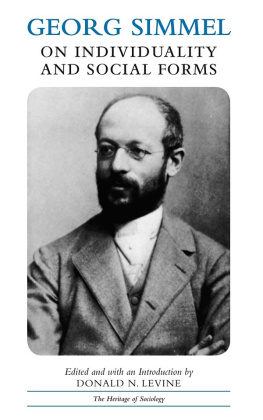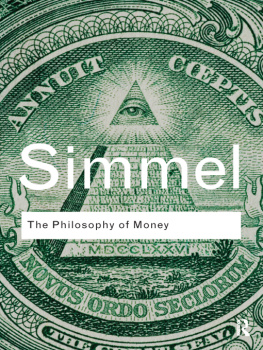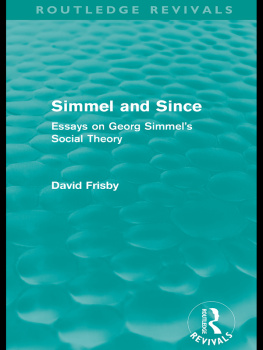Georg Simmel - Georg Simmel on Individuality and Social Forms: Selected Writings
Here you can read online Georg Simmel - Georg Simmel on Individuality and Social Forms: Selected Writings full text of the book (entire story) in english for free. Download pdf and epub, get meaning, cover and reviews about this ebook. City: Chicago, year: 2015, publisher: University of Chicago Press, genre: Science. Description of the work, (preface) as well as reviews are available. Best literature library LitArk.com created for fans of good reading and offers a wide selection of genres:
Romance novel
Science fiction
Adventure
Detective
Science
History
Home and family
Prose
Art
Politics
Computer
Non-fiction
Religion
Business
Children
Humor
Choose a favorite category and find really read worthwhile books. Enjoy immersion in the world of imagination, feel the emotions of the characters or learn something new for yourself, make an fascinating discovery.
- Book:Georg Simmel on Individuality and Social Forms: Selected Writings
- Author:
- Publisher:University of Chicago Press
- Genre:
- Year:2015
- City:Chicago
- Rating:5 / 5
- Favourites:Add to favourites
- Your mark:
- 100
- 1
- 2
- 3
- 4
- 5
Georg Simmel on Individuality and Social Forms: Selected Writings: summary, description and annotation
We offer to read an annotation, description, summary or preface (depends on what the author of the book "Georg Simmel on Individuality and Social Forms: Selected Writings" wrote himself). If you haven't found the necessary information about the book — write in the comments, we will try to find it.
Georg Simmel on Individuality and Social Forms: Selected Writings — read online for free the complete book (whole text) full work
Below is the text of the book, divided by pages. System saving the place of the last page read, allows you to conveniently read the book "Georg Simmel on Individuality and Social Forms: Selected Writings" online for free, without having to search again every time where you left off. Put a bookmark, and you can go to the page where you finished reading at any time.
Font size:
Interval:
Bookmark:
The University of Chicago Press, Chicago 60637
The University of Chicago Press, Ltd., London
1971 by The University of Chicago
All rights reserved. Published 1971
Printed in the United States of America
16 15 14 13 12 11 15 16 17
ISBN-13: 978-0-226-75776-6 (paper)
ISBN-10: 0-226-75776-5 (paper)
ISBN-13: 978-0-226-92469-4 (e-book)
LCN: 78-157146
 The paper used in this publication meets the minimum requirements of the American National Standard for Information SciencesPermanence of Paper for Printed Library Materials, ANSI Z39.48-1992.
The paper used in this publication meets the minimum requirements of the American National Standard for Information SciencesPermanence of Paper for Printed Library Materials, ANSI Z39.48-1992.
Georg Simmel
ON INDIVIDUALITY AND SOCIAL FORMS
Selected Writings
Edited and with an Introduction by
DONALD N. LEVINE
THE UNIVERSITY OF CHICAGO PRESS
CHICAGO AND LONDON
THE HERITAGE OF SOCIOLOGY
A Series Edited by Morris Janowitz
Acknowledgments
For helpful comments on the introductory essay I am greatly indebted to Robert K. Merton and Lewis A. Coser. Mrs. Robert Redfield kindly provided materials for the section on Robert E. Park. Guenther Roth graciously made available a copy of the unpublished manuscript by Max Weber which is cited in the essay.
A belated word of gratitude is due to Everett C. Hughes, whose seminar on Simmel in the mid-1950s helped confirm a young graduate students interest.
Introduction
Simmel as Innovator
Of those who created the intellectual capital used to launch the enterprise of professional sociology, Georg Simmel was perhaps the most original and fecund. In search of a subject matter for sociology that would distinguish it from all other social sciences and humanistic disciplines, he charted a new field for discovery and proceeded to explore a world of novel topics in works that have guided and anticipated the thinking of generations of sociologists. Such distinctive concepts of contemporary sociology as social distance, marginality, urbanism as a way of life, role-playing, social behavior as exchange, conflict as an integrating process, dyadic encounter, circular interaction, reference groups as perspectives, and sociological ambivalence embody ideas which Simmel adumbrated more than six decades ago. These and kindred ideas represent only a fraction of Simmels total intellectual output, which also included lasting contributions to aesthetics, ethics, epistemology, metaphysics, and intellectual history.
The period in which Simmels mature works appeared was one of great cultural ferment. Central Europe from the turn of the century to World War I witnessed the birth of psychoanalysis, relativity theory, logical positivism, phenomenology, atonal music, and several milestones of literature and humanistic scholarship. Berlin of the period was a congenial setting for the cultivated style of life and thought which Simmel followed. Born there in 1858, he remained to study at the University of Berlin, where he subsequently spent most of his academic career lecturing. He moved, to Strasbourg, only at the age of fifty-six, four years before his death.
Despite his record of achievement, Simmels position in the intellectual world of his time was notably ambiguous. Although his works were hailed by some of the foremost of his contemporaries, he was rejected by most of his professional colleagues in philosophy and the social sciences with an often malicious passion. Although groups of all persuasions vigorously discussed his writings in the cafs frequented by German university students, no students chose to follow him as an academic master. On close terms with a number of cultural luminarieshis friends and correspondents included Stefan George, Rainer Maria Rilke, Auguste Rodin, Edmund Husserl, Martin Buber, Albert Schweitzer, Ernst Troeltsch, Max and Marianne Weberhe has been described as the loneliest figure of them all.
MARGINALITY Simmels extraordinary originality may well be connected with his position as a relatively isolated thinker. He was, indeed, a stranger in the academy. The stylistic manifestations of a marginal position are striking in his written work. Neither in Simmels text nor in annotations does one find acknowledgment of scholarly predecessors or contemporaries. He speaks for himself, along with the immortal dead. What is more, Simmel deliberately shied away from recruiting disciples to carry on his kinds of inquiry. The contrast with his contemporary Emile Durkheimwho drew heavily and explicitly from a century of sociological predecessors, wrote copious footnotes, employed research assistants, founded and edited a sociological journal, and encouraged a school of younger men to carry on his workcould scarcely be more conspicuous.
The institutional manifestation of Simmels marginality was his failure to be granted full academic accreditation until the twilight of his life, and that in an unsatisfying appointment as professor at the University of Strasbourg in 1914. The victim of expressed anti-Semitism, pedantic aversions to his unprofessional style, and persisting biases against sociology in the German academy, Simmel spent nearly all of his career writing and lecturing at the University of Berlin without the benefit of a regular faculty appointment.
This exclusion from the German academic establishment doubtless reinforced the unscholarly aspects of Simmels His habit of omitting scholarly references was well established by the time of his first sociological publication: Simmels is the only entry in the 189091 volume of Schmollers Jahrbuch without footnotes.
A less superficial aspect of Simmels nonconformity was the disjointed, seemingly haphazard manner in which he presented his ideas. Rarely did he submit to the discipline required for systematic exposition of a body of knowledge. This trait, however, reflected neither laziness, indifference to his audience, nor arbitrary willfulness. Simmel was indefatigable in exploring the labyrinths of complex analysis. Concern for his reading audience is shown by the frequency with which he revised his writings for second and third editions. His lectures were prepared and delivered with exquisite care; he was reputedly one of the most brilliant lecturers of his generation. Indeed, some of the very disjointedness for which he has been faulted reflects the skill of the teacher, concerned more at times to engage and provoke his students through unusual illustrations and the disclosure of unexpected relationships than with relentlessly pressing forward a narrow train of thought.
INDIVIDUALITY Beyond this, it must be noted that Simmel maintained a studied ambivalence toward the canons and claims of objective scholarship. He believed that the ultimate justification for scholarship lies in the materials it provides
Philosophical conviction, therefore, as well as temperament combined with situational factors caused Simmel to follow the path of an academic which he pursued his own ideas and insights, exploring the unknown. His life illustrated a point which he articulated in his essay on the stranger: that the absence of firm social ties promotes intellectual freedom.
Simmels devotion to the principle of individuality notwithstanding, scholarship remains in many respects an inexorably communal enterprise. In a famous passage inscribed in his diary at the end of his life he wrote: I know that I shall die without intellectual heirs, and that is as it should be. My legacy will be like cash, distributed to many heirs, each transforming his part into use according to his naturea use which will no longer reveal its indebtedness to this heritage. It is time now, a half-century after his death, to take stock of the capital Simmel created, to trace the indebtedness of Simmels many heirs, to identify reserves from his legacy which have not yet been tapped.
Next pageFont size:
Interval:
Bookmark:
Similar books «Georg Simmel on Individuality and Social Forms: Selected Writings»
Look at similar books to Georg Simmel on Individuality and Social Forms: Selected Writings. We have selected literature similar in name and meaning in the hope of providing readers with more options to find new, interesting, not yet read works.
Discussion, reviews of the book Georg Simmel on Individuality and Social Forms: Selected Writings and just readers' own opinions. Leave your comments, write what you think about the work, its meaning or the main characters. Specify what exactly you liked and what you didn't like, and why you think so.









